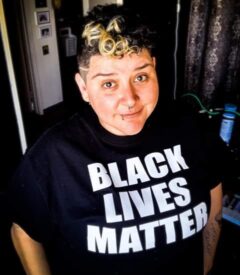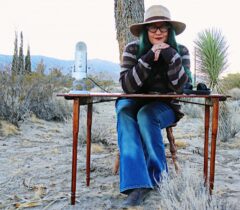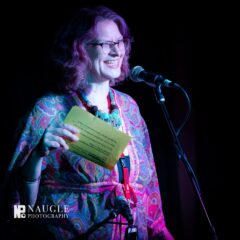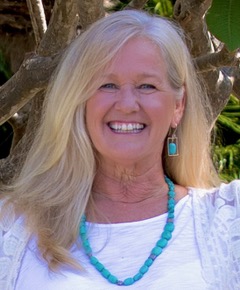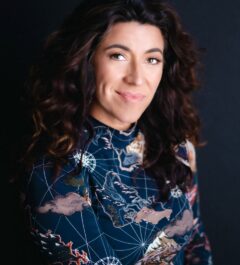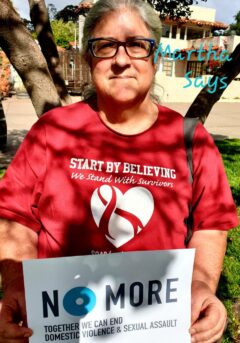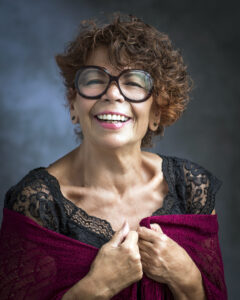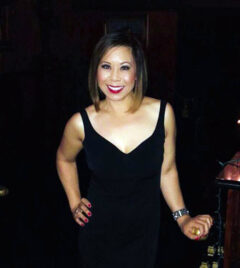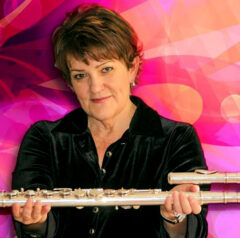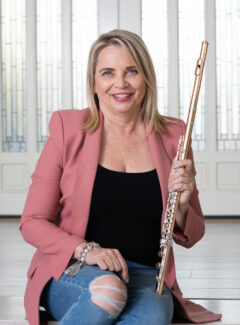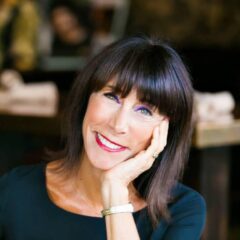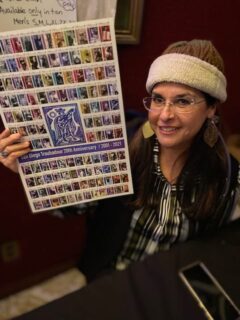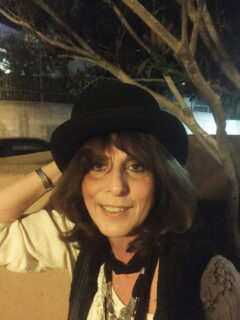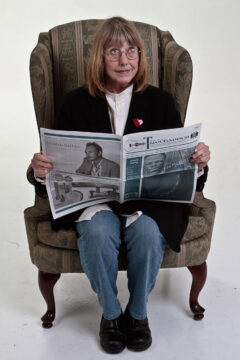Cover Story
Honoring Female Contributions While Striving for a More Human-Centered World
Local vocal coach Francesca Valle describes an interaction with a San Diego booker for a popular local venue. The booker, who happened to have been a man, couldn’t remember to give her a call because she had the same name as another woman he didn’t like. She describes this as “subversive sexism”…he didn’t have a problem with women, per se, but saw them as interchangeable.
“I want to live in a world where I don’t require a person to be a man or a woman,” Valle says. She mentions a Jewel song and a particular lyric: “no longer lend your strength to that which you wish to be free from.”
San Diego music mainstay Cathryn Beeks echoes that sentiment. “I envision a scene where egos and gender roles are as antiquated as pay phones,” she says. Founder of ListenLocalRadio.com, Beeks has been producing and promoting shows in San Diego for decades.
Claudia Russell, KSDS jazz doyenne agrees: “Someday I hope we don’t have to have this conversation anymore.”
It’s tempting to want to examine divisions in society. Our modern life has been divided along various lines: gender, race, religion, class. Many of those lines of exclusion still exist, of course. But San Diego’s music scene could be a place where these lines could be blurred or eliminated and old ways of doing things could be dismantled and replaced with respect, compassion, and empowerment.
In reality, of course, women have been an oppressed majority. (And isn’t that weird? There are more women than men, but women have historically been excluded either by law or by social practice, from so many fields.) Music is no exception.
“It’s no secret that the music business has been a male-dominated industry but there has always been a small, elite group of women who were pioneers,” says Shauna Aguirre, talent manager/booker at Humphreys. “I guarantee you that all of us have faced sexism in some form or another and had negative experiences based on our sex. I’ve had men think they could bully me into a better deal for their artists. But I know that those experiences have made me stronger and having those experiences makes us more empathetic with other women trying to get their foot in the door.”
Martha Sullivan, who hosted and booked the Oasis House Concerts for many years, notes that women have been working behind the scenes since music began, often as free labor. “As in many low-revenue activities, I believe women provide a lot of unpaid/low-paid labor to support the San Diego music scene,” she says.
Steph Johnson is well known in San Diego as a talented singer-songwriter and has worn many hats in the music business. She’s seen first-hand how sexism has worked against women trying to get ahead. “I think it’s still rare to have a woman behind the mixing board or in a studio to be the engineer,” she says. “Even band members, in the jazz/blues/funk/soul area, it’s rare to see a woman playing an instrument. There are women out there doing it.”
Old-school misogyny has been part of many male-dominated industries since women became part of the work force. But things have improved, albeit incrementally. “When I first started,” Russell says, “every time you turned around someone was making a remark, saying things like ‘you’d get a better interview if you wore a low-cut blouse.’ That would not fly now.”
“I guarantee that all of us have faced sexism in some form or another and had negative experiences based on our sex,” Aguirre notes. “I’ve been mistaken for a hostess at my venue.”
Beeks noticed when she came to San Diego in 2003 that there were very few women behind the scenes. “I got to know the few that there were, and they always seemed to be battling adversity and challenges. Being a woman in this business in this town did, in fact, make a difference. It sounds cliché but we do have to work harder to be recognized, respected, and included.”
“I think women still deal with a double standard,” Johnson adds. “If you’re attractive and smart and good at your job, you might get the call.” But after that, she says, women have to prove themselves to an extent than men often do not.
In her work with the Voices of Our City Choir (now a thriving nonprofit that does more than offer unhoused people community and a chance to sing and be seen), Johnson specifically has made it a point to hire female recording engineers, live sound mixers, stage managers. “I try to employ women when I can,” she says. “That’s probably because I am a woman and I have that perspective. If we had more women in leadership that would happen more often.”
Claudia Russell has seen much the same. “There are still good-old-boy networks, and those will always exist. But behind the scenes in San Diego music, there are a helluva lot of impressive women doing work that people don’t realize.”
Another factor in all of this is that people in general don’t understand what goes into booking, promoting, and producing a music event. The audience sees the tip of the iceberg—the seamless performances onstage—but not the months of planning, preparation, and problem solving that had to happen to make it appear seamless.
RosaLea Schiavone, booker and founder of Wicked Harem Promotions, notes that “sometimes we don’t get the attention—how much it is that we do as bookers, agents, promoters, producers. They don’t know the things that have to be organized—working with a band is like herding cats…it’s a good thing I was in veterinary medicine before I got into music!”
And that coordination of “cats” and everything else that goes into a concert is mind boggling. Some of the most impressive feats in San Diego have been undertaken and successfully achieved by women. Arlene Damasco, social media and publicity specialist, Jazz in San Diego Marketing and Promotions can cite many, many contributors who have made their mark on the scene.
“[Jazz flute icon and booker/promoter] Holly Hofmann is a local treasure who brought national acts like Diana Krall, Cassandra Wilson, Tommy Flanagan, and Joe Henderson to regional jazz fans! Beth Ross-Buckley is the founder and CEO of Camarada, the Chamber Music Orchestra, carved out a unique niche in Latin and Spanish music in San Diego. Steph Johnson is making an impact for the rights of the homeless and it started with music!” Johnson gained national recognition when her Voices of our City choir, co-founded with the late Nina Deering, and figured prominently on the television shows America’s Got Talent.
Many women have been at the forefront of change here. Danielle LoPresti founded IndieFest in 2004 and offered San Diego top-shelf local and international talent until 2016 when she and her wife, Alicia Champion, moved to Oakland. Bonnie Wright’s Fresh Sounds series offered a staggering 224 installments of world-class music since 1997 and concluded only after Wright retired this past November. Gator by the Bay wouldn’t exist without the diligent efforts and promotional talents of Catherine Miller. And, of course, Ingrid Croce brought jazz, blues, and pop to downtown San Diego years before the area was developed, and in part started the vibrant revival of the city’s core.
Sexism exists, but many women interviewed for this story pointed out that there are many, many men who are cooperative and empathetic, and they tend to be more successful in the business. “It’s about building good relationships, whether man or woman, and also for me, a mutually beneficial partnership between the artist, venue, and sponsors,” Damasco said. She co-founded the Art Meets Jazz series with, and featuring, Gilbert Castellanos at the Bread & Salt Gallery. “I want to know what will make it a win-win for all involved.”
Myrna Vasquez, an active volunteer in the music scene, notes that the majority of the physical heavy lifting—lights, sound, stage rigging, hauling equipment—is still done by men. “In many ways, it’s still a man’s world,” she notes. Schiavone agrees. “99 percent of the people who haul all the stuff around, put up the tents for festivals, set up the sound boards—those are men who we wouldn’t be able to do shows without. It’s important that we recognize that there are many, many men behind the scenes, too, that are facing the same kind of stuff we do as women.”
Emily Bartell of BarNone Productions, assistant coordinator of the San Diego Music Awards and Music Scene SDTV, is a veteran of the entertainment industry. She’s concentrated on the music business for around five years. She books several venues but primarily operates from her home base of Navajo Live. She’s proud of highlighting new bands and encouraging and nurturing new talent.
Like many women warriors in the San Diego music scene, Bartell wants to expand horizons. She introduced Original Music Mondays at Navajo Live where she “cross pollinates” two bands with a smaller following to help each gain new fans. In her opinion, the pandemic has changed some things in the music scene: “people will come out now and don’t care what night it is,” she says. Likely because many more people are working flexibly, maybe the concept of the traditional weekend is waning.
Schiavone agrees. “I think it’s coming back slowly, but I think it’s going to be more healthy. We’re moving beyond surviving to thriving, and I think by working together, we can make that happen.”
“The pandemic has helped us all realize how much we need and want live music,” Aguirre says. “When we re-opened last year we saw a huge surge. When the restrictions are lifted and we rise out of this, which is already starting to happen, I feel the appetite for live music is going to be fierce!”
Jazz giant Holly Hofmann sees an opportunity for new growth after the devastating impact of the pandemic and perhaps a new appreciation of authentic, in-person performance and a more real-world listening experience. “There is a resurgence. Young people I find are buying turntables and LPs again. Our record label in Denver said they’re selling more LPS than CDs.”
Hofmann’s Westgate Hotel gigs are back and packed; artists like Sacha Boutros book regular live music at venues like Il Sogno Italiano and Sacha’s Supper Club. Russell just launched a new KSDS show, Bohemia After Dark, Mondays through Fridays from 7-10 p.m., which promises even more eclectic sounds. Crowds are starting cautiously to return to venues, hungering for live performance.
“The pandemic turned things upside down,” Damasco says. “It put a huge pause on whatever we were doing at the time that was our ‘normal.’ It was cool to see the cats adapting to keep the music going, keep a little bread flowing… a shout out to Louis Valenzuela who quickly set up Electriclouieland to offer jazz livestreams. He also began pushing this content out via Twitch, which gave local artists the chance to reach a global audience! With most live music being non-existent for a while, artists had to shift and really think about communication channels and how to integrate it into their plans to continue sharing their music.”
This new digital world, borne of necessity, may offer even more opportunities to everyone. “It’s not ever going to go back to being “the same” because there will always be people who will continue to be concerned about their health and prefer to not be among too many people in an indoor setting,” Damasco notes. “We’re lucky that 12 months of the year, we can enjoy entertainment outside, even if it means bundling up to do so. Continuing to adapt and giving your audience multiple ways to access your music is key.”
Liz Abbott, publisher of the San Diego Troubadour, has been a tireless advocate for the San Diego music scene for 20 years. The magazine has become something of a glue that binds the community together, and the decision to make it an entirely online endeavor widens its scope in many ways and makes more coverage available for members of the San Diego music community.
In discussing the role of women in San Diego music, Abbott notes a lack of female recipients of lifetime achievement awards through the San Diego Music Foundation (SDMA). She pointed out that only one woman—jazz legend Jeannie Cheatham—has been given a lifetime achievement award and that was with her husband Jimmie in 2006. Abbott feels grateful and lucky to have been awarded the 2021 Music Industry Award for her work in music journalism, and the late Candye Kane won that same accolade in 2014, the inaugural year of that particular award.
“For the past five years, I’ve watched the scene evolve, and I am optimistic about where it’s going,” Beeks says. “There are more people who are making things better, like you writing this article and bringing things like this to the surface so we can all learn and be better and make the scene stronger. San Diego has by far the most supportive and dynamic music scene out there. We are rad. We can be radder.”
“We were making a lot of progress, and in the past two years we’ve done a lot of backsliding on a national scale,” Russell says, “but as far as San Diego goes, a lot of what’s moving in the arts scene is being driven by women.”
So, picture this: a future in music where cooperation is the norm and competition is friendly. Where San Diego is a place of opportunity and innovation, not only in live venues but in alternative ways of delivering shows and experiences to local and global audiences. With a full pantheon of inspiring women finding creative new ways to solve industry problems, there is cause to be hopeful as Spring comes around. The tone is optimistic, and the work ethic is solid, the passion is off the charts.
Note: Obviously, there are many more women who deserve to be included in this group. Either we ran outta room or couldn’t reach them for comment. And let’s not forget all the wives and girlfriends who support their partners’ music careers!










